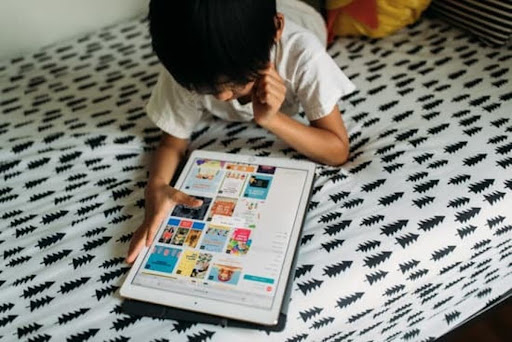The world is becoming digital, and the kids are becoming more active, which means more screens are used everywhere – from smartphones and tablets to smart TVS and laptops. Screen time has become an inevitable part of children’s daily life, whether it’s online learning, gaming, or scrolling through YouTube. But the question arises, Is excessive screen time detrimental to the child’s development, behaviour, and overall health?
Hence, limiting screen time for kids is more important than ever.
Effects of Too Much Screen Time on Kids
Too much screen time can affect children in several ways:
1. Sleep Disruption
Did you know? A blue light is emitted by screens, which interferes with melatonin production in children, making it harder for kids to fall asleep. It was found in a study that those who use screens close to bedtime often find it hard to sleep on tim,e and even if they do, the quality of the sleep is poor.
2. Behavioural Issues
There are also psychological effects because of excessive screen use such as irritability, lack of focus, and aggression. A decline in emotional connection is also witnessed, especially in toddlers who need face-to-face interaction with humans to develop social and motor skills.
3. Delayed Development
For young children, interactive play and real-world experiences are crucial for cognitive and motor development. It exposes them to the real world and prepares them for the future. Passive screen time interferes with how they view and function in the world by delaying language abilities, problem-solving, and physical coordination.
4. Computer Vision Syndrome and Bad Posture
Eyes are sensitive to the radiation emitted by the screen. Eyes are not designed for such bright lights coming out of it. Long hours on digital devices can cause eye strain (computer vision syndrome), headaches, and poor posture. This can lead to long-term health concerns if not addressed early.
Recommended Screen Time by Age Groups
Wondering how much screen time is healthy for kids?
Health organisations like the World Health Organisation (WHO) and the American Academy of Paediatrics (AAP) recommend:
- Under 2 years: No screen time (except video chatting with family)
- 2 to 5 years: Maximum 1 hour per day of high-quality content, which is healthy screen time
- 6 years and older: Consistent limits; balance screen time with play, sleep, physical activity, and social interaction
Why Screen Time Management Matters
We live in a tech world. Let’s face it, we cannot avoid screens entirely. Only those who live under a rock can do it but not us. However, we can manage it for a better lifestyle of kids and here is how we can do it:
- By developing healthier digital habits
- Improving focus and creativity
- Maintaining better physical and mental health
- Learning how to self-regulate screen use as they grow
Balance! Don’t restrict!
Practical Screen Time Management Tips for Parents
Here’s how parents can promote healthy screen habits and maintain screen time guidelines for children:
Set clear rules: Balancing screen time and play time by having consistent screen time boundaries for school days and weekends
Create screen-free zones: Reducing screen time for kids naturally by keeping devices out of bedrooms and at the dinner table.
Model healthy behaviour: Healthy screen habits for children. Remember, kids learn by watching.
Use parental controls: Limiting screen time for kids by using built-in tools to monitor and limit app usage.
Encourage alternatives: Reading, outdoor play, board games, and family time should be part of the daily routine for both screen time and child development.
Conclusion
Technology isn’t the enemy, but unmonitored screen time is a growing concern for today’s parents. Managing how and when your child uses screens can support better behaviour, learning, and health. Managing screen time for toddlers and children is necessary.
With a thoughtful approach, you can help your child build a healthy relationship with screens that will benefit them for life.
FAQS – Kids and Screen Time
Q1: Can screen time be educational?
Yes, with the right content. Look for age-appropriate, ad-free, and interactive educational apps or videos. Learn the difference between bad screen time and good screen time.
Q2: Is screen time bad for toddlers?
Yes, especially passive screen time. It can hinder language and brain development in children under 2.
Q3: How do I reduce screen time without tantrums?
By gradually engaging offline alternatives, and involving your child in the planning of screen time schedules.
Q4: Are video games harmful to kids?
Anything in extreme is bad. Violent games and extended play without breaks can lead to behavioural issues. The key is moderation.
Q5: What’s the best way to track my child’s screen time?
Apps like Google Family Link or Apple Screen Time to monitor and set daily limits for parental control.
- Baby Monitors with Noise Monitoring: How They Work and Why They Matter - October 2, 2025
- Attachment Parenting Guide: Principles, Practices, and What to Expect - September 9, 2025
- Understanding Your Baby’s Cry: A Parent’s Mini Guide - June 23, 2025
- Bottle vs. Breastfeeding: What Works for You and Your Baby - June 18, 2025
- 10 Yoga Poses For Kids at Home: Benefits Of Yoga For Kids - June 12, 2025
- Parenting Guide to Child Development: Key Milestones from Birth to 10 Years - June 4, 2025
- Summer Vacation Plans Ideas with Kids - May 27, 2025
- Nutritious Dried Fruit Treats for Toddlers (16–24 Months) - May 25, 2025
- Importance of Screen Time Management for Kids - May 24, 2025
- The 6 Most Common Pregnancy Concerns First-Time Moms Have - May 23, 2025













